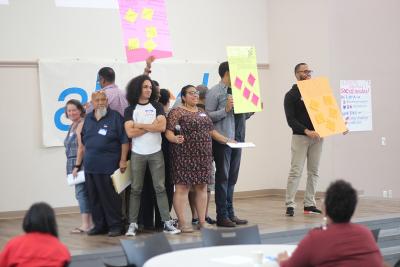
Democracy is a dearly beloved concept in the United States when it comes to politics. But what about capital?
Most capital is allocated by dictatorship — or perhaps at best, a plutocracy. Many people contribute capital to a fund or institution, which then has a relatively tiny team making decisions about the allocation of capital (for instance, across companies in the public markets). This means that often their decision-making is narrowly defined as serving the financial interest of their investors and institutions — rather than addressing the societal impact of the actual investments placed.
But what happens when hundreds of people come together to decide how capital can best serve their community? What would look different?
This is precisely what the Ujima Project set out to create. Recently, this economic development and community-organizing collective launched its first fund, a $5 million vehicle co-designed, governed by, and grounded in working-class communities of color in Boston. This interview with leaders Aaron Tanaka, Nia Evans, and Lucas Turner Owens provides a roadmap to the democratization of capital.
Go to the GEO front page

Add new comment